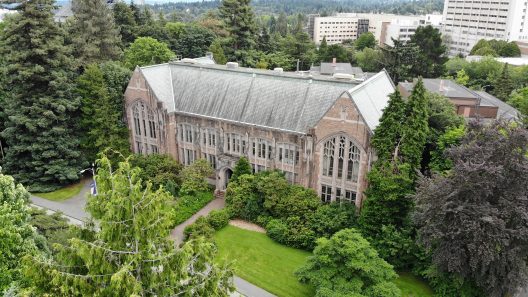 As we kick off a new semester, we’re excited to share an update on the upcoming renovation of Anderson Hall. Last spring, the Washington State Legislature passed the 2023-25 state budget, including $28.65M toward the $40M cost to renovate Anderson Hall. We are thrilled to embark on this process and advance our vision for teaching, learning, and research in this landmark building.
As we kick off a new semester, we’re excited to share an update on the upcoming renovation of Anderson Hall. Last spring, the Washington State Legislature passed the 2023-25 state budget, including $28.65M toward the $40M cost to renovate Anderson Hall. We are thrilled to embark on this process and advance our vision for teaching, learning, and research in this landmark building.
This year, design firm Hennebry Eddy and contracting firm Lease Crutcher Lewis were selected to lead this historic redesign and have been collaborating closely with SEFS leadership, faculty, staff, and students. Our design team has been working to create a plan that reflects the budget of the project, historic preservation of the building, and needs of the SEFS community. Together, we have come up with the following five objectives to drive the renovation process:
- To provide welcoming and inclusive spaces enabling the brightest minds in science to work across disciplinary boundaries
- To modernize classroom and office space, supporting impactful research and cultivating a sense of community
- To create flexible learning environments that promote innovation, engineering, and analysis in support of forest-dependent industries and culturally significant uses by Western and Indigenous populations
- To respectfully, thoughtfully, and strategically renovate this historic building
- To strategically reinvigorate the plaza between Anderson Hall, Winkenwerder Hall, and Bloedel Hall
After graduation in 2024, staff, faculty, and students in Anderson Hall will be relocating to offices on the 4th and 8th floors of Condon Hall for the duration of the construction process, which is estimated to occur from July 2024 to December 2025. We will continue to provide updates as the planning process moves forward.
Thank you to the dedicated SEFS students, faculty and staff members who have provided ongoing input during this process, including everyone who responded to the online survey and those who participated in focus group meetings, including Kent Wheiler, Sergey Rabotyagov, Liz Collier, Ellen Adams, Mary Keyes, Matt Gray, Christina Bjarvin, and Hemalatha Velappan.




 About the Talk
About the Talk
